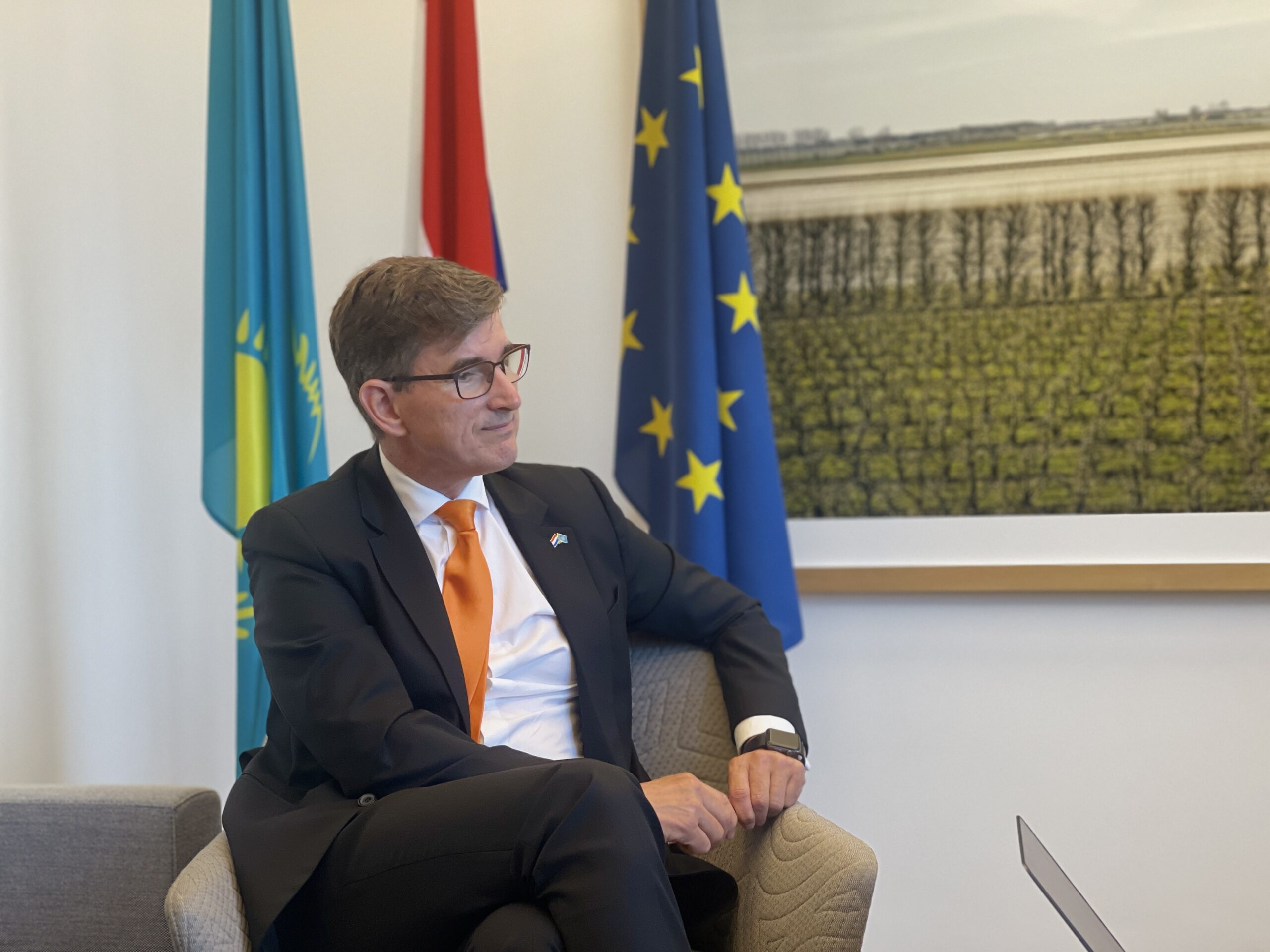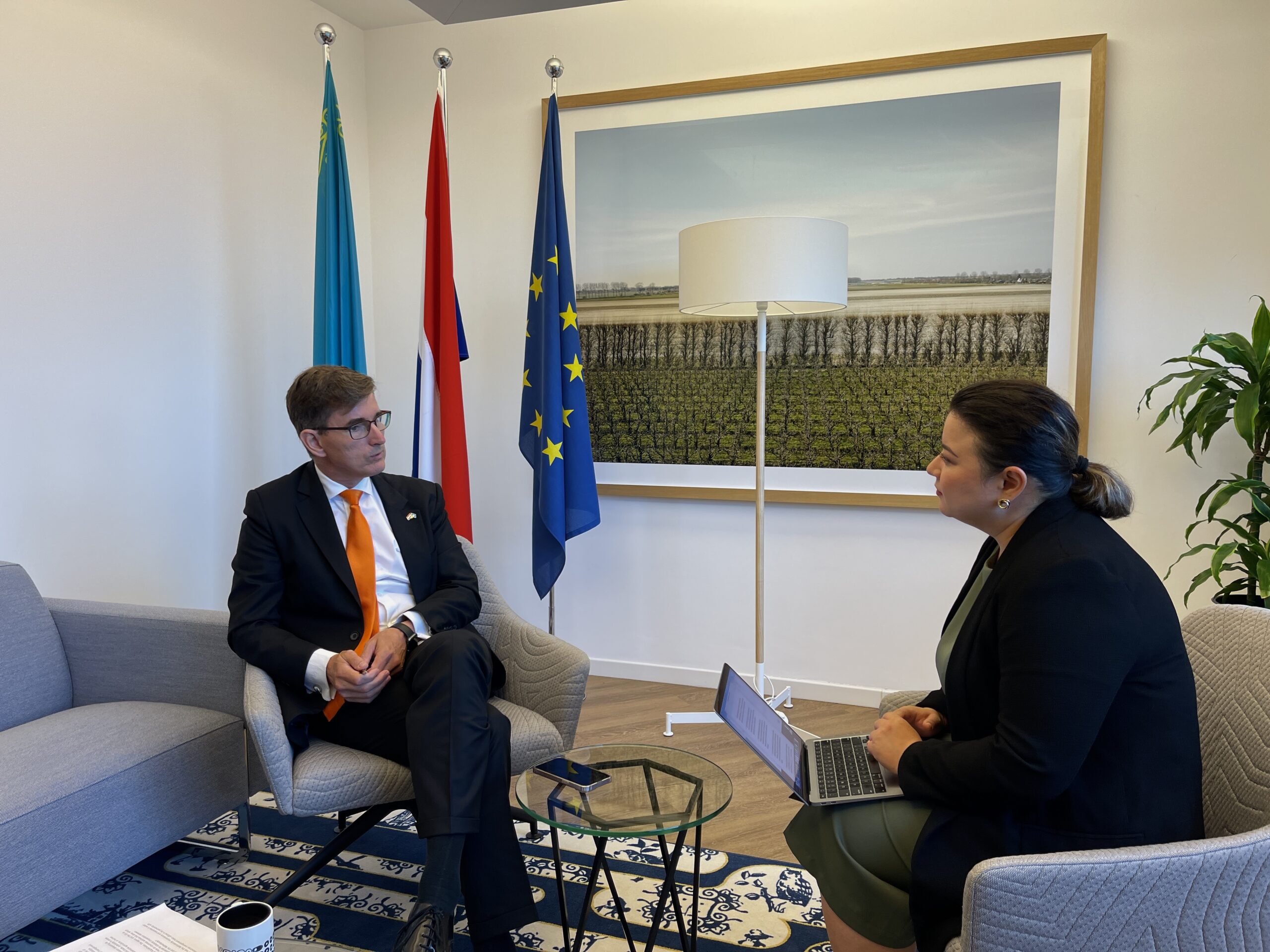ASTANA — The Netherlands and Kazakhstan are deepening their partnership by harnessing Dutch water management and agriculture expertise to tackle Central Asia’s critical challenges. In a recent interview with The Astana Times, Ambassador Nicolaas Schermers of the Netherlands emphasized the strategic cooperation between the two countries, highlighting their shared commitment to addressing pressing issues and exploring new growth opportunities.

Nicolaas Schermers. Photo credit: The Astana Times
Economic reforms: enhancing the investment climate
Kazakhstan has recently implemented economic reforms to enhance its investment climate, attracting notable international interest. Under the leadership of President Kassym-Jomart Tokayev, these reforms have significantly improved the investment environment, resulting in record investment inflows despite global economic uncertainties. The Netherlands, in particular, is the largest foreign investor in Kazakhstan, with investments reaching $4.4 billion last year. The ambassador highlighted that these conditions have notably improved.
“Transparency is especially crucial for Dutch companies. They are willing to pay taxes, provided there is clarity about which taxes are required. In this respect, Kazakhstan has made significant progress in recent years. The governmental system makes what to expect clear. In legal terms, if there is a dispute, there is a place you can go to fight and see who’s wrong or right again. That is part of transparency. Regarding corruption, I think Kazakhstan has also made good progress. All these things are crucial for companies when they decide to invest or not,” he said.

During the interview with the ambassador.Photo credit: The Astana Times
However, the geopolitical landscape poses challenges. The ongoing war in Ukraine and Kazakhstan’s proximity to Russia may pose challenges for potential investors. According to him, it is vital to maintain a strong relationship on sanction management and ensure that sanctions are not circumvented through the country’s territory.
While acknowledging that Kazakhstan’s performance is commendable, there is a consensus on the need for further improvement.
“We also know that on the technical level, we need to step up together, which is not only Kazakhstan’s responsibility. It is a joint effort, and we stand ready to support Kazakhstan also in that area, where we also realize the very difficult situation you are in that regard,” he added.
Cooperation in water management and agriculture
Agriculture is a key component of the partnership between the Netherlands and Kazakhstan. In November 2023, a dedicated agricultural committee was formed to boost cooperation in this crucial sector. One focus area is exploring investment opportunities and how governments can encourage investments in Kazakhstan’s agricultural sector.
The focus is not only on investing but also on the knowledge that Dutch companies typically bring with their investments. Ambassador Schermers highlighted that while constructing a greenhouse is relatively straightforward, fully realizing its potential requires more than just an engineer for the overall design. It necessitates personnel who can manage the daily operations and complexities of the greenhouse. Consequently, training these individuals is crucial, and this is an additional aspect being addressed by the committee.
The Netherlands, the second-largest exporter of agricultural products, owes its success to a post-World War II decision to invest in agriculture to rebuild the country. The government prioritized agricultural development, creating Wageningen University, a Center of Excellence in agricultural research. The Netherlands became a hub for agricultural knowledge and production domestically and internationally. Dutch farmers have ventured to countries like Kenya and Colombia to produce various goods, then traded on Dutch markets, attracting global buyers and sellers.
The bilateral agricultural committee also addresses potential trade barriers and regulatory challenges, advocating for Kazakhstan’s accession to the International Union for the Protection of New Varieties of Plants (UPOV). It provides access to high-quality plants capable of thriving in diverse conditions. For instance, some breeds of potatoes can grow in wet, cold, hot, or high-altitude areas. Adapting to local climate conditions can significantly enhance crop yields. Therefore, Kazakhstan’s accession to the UPOV agreement is a vital topic for the committee.
Given the Netherlands’ global reputation for water management and engineering, water management stands at the forefront of the bilateral partnership.
“As the Netherlands, we have dealt with floods all our lives and all our history that goes back millennia,” Schermers said.
With its diverse climate and geography, Kazakhstan faces significant water management challenges. The Netherlands is contributing its centuries-old expertise to address these issues, focusing on areas such as Atyrau in the north and east of Kazakhstan. Advanced water management systems are needed to predict and respond to fluctuating water patterns exacerbated by climate change.
The partnership was formalized by signing memoranda of understanding on water management, setting the stage for ongoing collaboration. Dutch experts will visit Kazakhstan, and Kazakh experts will travel to the Netherlands to explore technological advancements and adapt them to local needs.
Ambassador Schermers highlights the broader implications of this cooperation, noting, “Our philosophy is to act as brokers of expertise. We learn from the specific conditions in Kazakhstan, share our knowledge, and together build solutions that can benefit other countries facing similar challenges worldwide.”
The partnership also addresses the Aral Sea crisis. According to Ambassador Schermers, while a solution cannot be imposed externally, efforts can be made to facilitate discussions among the six countries around the sea basin to address their needs. Schermers noted that the Netherlands sees itself, in this case, as a facilitator in water diplomacy. The Clingendael Institute, a leading diplomatic institute in Hague, plays a key role in this effort by training diplomats from Kazakhstan and other Central Asian countries, among others, in this crucial area.
Building bridges: technology, education, and people-to-people connections
Beyond water management and agriculture, ambassador Schermers underscored the importance of knowledge exchange and fostering people-to-people connections. According to Schermers, this is the foundation for solid relations and capacity building, a philosophy the Netherlands believes in.
“In the Netherlands, when we invent something, we do not keep it secret because we know it will be taken or found by someone else. You better share it. Based on that, we can increase the level of knowledge in many fields, and that is how we try to keep our economy innovative, and that is also how we connect to other countries, and that is what we think is also important in the relationship with Kazakhstan,” he said.
While formal scholarship programs are limited, initiatives such as the Bolashak program and partnerships between Dutch and Kazakh universities play a crucial role. Erasmus University in Rotterdam, Wageningen University, and other institutions collaborate to provide their Kazakh counterparts with educational opportunities and training programs.
The Netherlands also conducts training programs for Kazakh diplomats and professionals, fostering long-term relationships and mutual understanding. These initiatives are essential for strengthening ties and ensuring sustainable development across various sectors.
The visit of Prime Minister Mark Rutte: cementing strategic partnerships
Prime Minister Mark Rutte’s recent visit to Kazakhstan, as he soon assumes the responsibilities of General Secretary of the North Atlantic Organization (NATO), underscored the significance of the Netherlands-Kazakhstan relationship. Ambassador Schermers reflects on the visit: “It was symbolic, marking both the first and last country outside the EU that Rutte visited during his tenure.”
The visit focused on political and economic cooperation, highlighting Kazakhstan’s role as a middle power in the geopolitical context. Prime Minister Rutte’s discussions with Kazakh leaders reinforced the Netherlands’ commitment to deepening ties and exploring new avenues of collaboration. According to the ambassador Schermers, the visit was brief but impactful.
One of the highlights was the opening of Amsterdam Square in Astana, symbolizing the growing cultural and economic connections between the two countries. This reciprocal gesture follows the establishment of Astana Square in Rotterdam, signifying the balance and harmony in their relationship.
The visit also served as a platform to express solidarity and support for Kazakhstan’s recent flood challenges. With its historical experience in managing floods, the Netherlands offered expertise and assistance, further solidifying the partnership.
